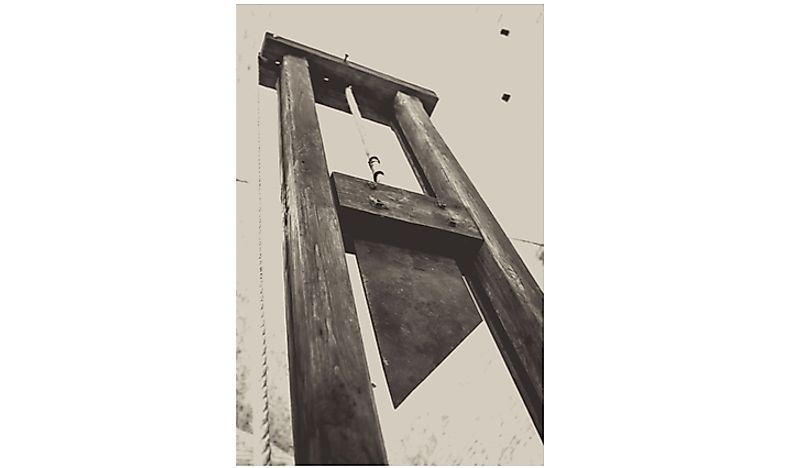Did You Know That The Most Recent Execution By Guillotine In France Was In 1977?

History of the Guillotine in France
The mention of a guillotine evokes horrifying images of bloody, beheading executions in our minds. These feared death machines were rampantly used during the French Revolution of the 18th Century. However, the history of decapitating devices dates back even further in time. A guillotine-like device was already in use in Ireland in 1307, and in Italy and Southern France in the 16th Century. The use of the guillotine in France was first promoted in 1789 by Dr. Joseph Ignace Guillotine, a physician and a deputy of the National Assembly of France. The first guillotine was designed in 1792 by a German piano maker named Tobias Schmidt, and was first tested on animals and human corpses. The first criminal to be decapitated by a guillotine was Nicolas Pelletier, a thief and assaulter who was beheaded on April 25th, 1792. However, the guillotine earned its fierce reputation only during the French Revolution, when nearly 40,000 victims, many of whom were likely innocent, were subjected to death under blade of the feared guillotine. At one time, the guillotine claimed as many as 3,000 lives in a single month during the French Revolutionary Period. Blood from decapitated bodies in public execution sites flowed down the streets and into the gutters, creating an atmosphere of terror in the region. The most discussed guillotine victims were King Louis XVI, and his queen, Marie-Antoinette, who were killed in 1793 for charges of treason against the new French Republic. After the French Revolution, public executions with the guillotine continued until 1939, when the last person to be publicly executed was the six-time murderer Eugen Weidmann. In the 1940’s, during the Second World War, the number of executions by guillotine rose once again, and then began to fall in the period between the 1950's and 1970's.
The Case of Hamida Djandoubi
Hamida Djandoubi, who was born in Tunisia in 1949 and later settled in Marseilles, France, was an infamous murderer who shocked the world with the brutal and inhumane murder of a Frenchwoman named Elisabeth Bousquet. Djandoubi, a grocery store worker and, later, a landscaper, met with a workplace accident in 1971 that led to the loss of two-thirds of his right leg. In 1973, a complaint was filed against him by the 21 year-old Elisabeth Bousquet, who claimed he had forced her into prostitution. After his imprisonment and release from custody, he wouldn't forget Bousquet, and decided to take revenge upon the poor woman. In July of 1974, Djandoubi kidnapped Bousquet and, at his home in front of the horrified eyes of two other girls in his capture, he tortured Bousquet in an inhumane manner, beating her and stubbing lit cigarettes over her private parts. Finally, he took her away in his car to the city’s outskirts, where he killed her by strangling. After Bousquet’s body was discovered, and another girl who had been kidnapped by Djandoubi had managed to escape and report him to the police, further investigations were made. It was not long before Djandoubi’s terrible tale of crime came to the forefront of the French media and justice system. He was arrested on charges of premeditated torture, murder, and rape, and consequently sentenced to death on February 25th, 1977. His appeal against his sentence was rejected and, on September 10th, 1977, he was executed by beheading on the guillotine. His death is currently marked as the last executed death sentence in France.
The Abolition of the Guillotine and Current Status of the Death Penalty in France
For a long time, the death penalty in France had been a topic of heated debate, with many favoring it as the right way to punish the guilty for their horrendous crimes, while others disapproved of the fact that such executions, in their eyes, completely smothered out the flames of human life and basic rights. Finally, on August 26th, 1981, the Council of Ministers of the French Parliament approved the bill to abolish the death penalty in the country. It was soon passed by the Assemblée Nationale, and was implemented in the nation. Thus, brought to an end was the role of the infamous French guillotine, and Djandoubi's 1977 execution still stands as the last capital punishment administered by the French legal system.











